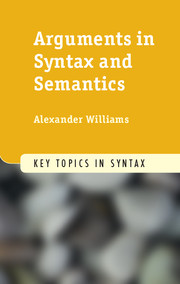1 - Syntax
Published online by Cambridge University Press: 05 January 2015
Summary
INTRODUCTION
A theory of argument structure tells us how arguments relate syntactically to predicates. In this chapter I introduce a few aspects of syntax that matter to this. My intention is to provide not a theory of syntax, but a general framework within which different views can be discussed, neutralizing somewhat the diversity of perspectives in this area. I start with a view of grammar as derivation (Section 1.2) before distinguishing Syntax from Lexicon (Section 1.3). I then briefly discuss syntactic category (Section 1.4) and displacement (Section 1.5). Section 1.6 concludes with a delicate but consequential distinction between lexicalized and nonlexicalized syntax. Further relevant issues, such as case and grammatical relations, are discussed by other authors in the Key Topics series.
GRAMMAR AS DERIVATION
A grammar analyzes big items into smaller ones. The analysis is done at different levels, with the unanalyzed primitives of one level perhaps undergoing analysis at another. In this book I choose to talk about analysis in terms of building structure, assembling bigger expressions out of smaller ones. For each level, we specify its primitives and its rules of combination. Accordingly I choose to talk in derivational terms, rather than in terms of constraints on structures. That means I will speak of a rule of combination taking one or more expressions as inputs and yielding a new expression as an output.
For example, take (1) and (2) to be two expressions, carry and the chair, respectively. Each expression pairs a phonological feature structure, /keɹi/ or /ðə.t∫eɹ/, with a syntactic feature structure, V[N] or N. For now I ignore meaning.
(1) 〈/keɹi/, V[N]〉
(2) 〈/ðə.t∫eɹ/, N〉
(3) informally defines a rule of combination, Check. The rule takes two expressions as inputs and yields a third as its output. The phonological features of the output concatenate those of the inputs. The syntactic category of the output is X, if those of the inputs are X[Y] and Y.
- Type
- Chapter
- Information
- Arguments in Syntax and Semantics , pp. 11 - 22Publisher: Cambridge University PressPrint publication year: 2015



